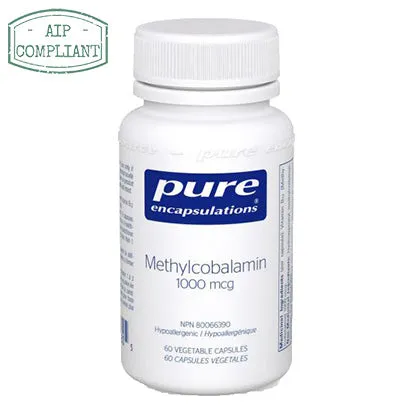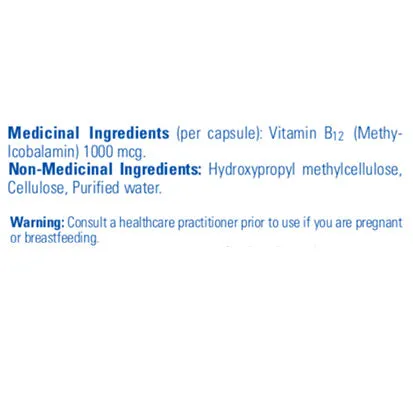Vitamin B12 is a water-soluble vitamin necessary for the maintenance of a healthy nervous system and for the metabolic utilization of fats and proteins. Vitamin B12 is also essential for the synthesis of DNA during cell division and therefore is especially important for rapidly multiplying blood cells.
Methylcobalamin is an activated, bioavailable form of vitamin B12 that acts as the principal circulating form of cobalamin in the body.
It is believed that about half of us have some type of genetic mutation that makes it difficult to methylate, so for many it is important to take B12 in active, methylated form. Pure Encapsulations methylcolbalamin is made with the highly bioavailable, methylated form of vitamin B12.
Insufficient levels of B12 impairs the immune system’s ability to fight off pathogens and viruses. A B12 deficiency can also result in pernicious anemia, impaired nerve function, and impaired mental function.
Several studies have shown that vitamin B12 levels in serum, red blood cells, and CNS are low in multiple sclerosis leaving them more vulnerable to nerve damage.
Pernicious anemia is an autoimmune disease that affects the gastric mucosa and results in gastric atrophy. If pernicious anemia is left untreated, it causes vitamin B12 deficiency, leading to megaloblastic anemia and neurological disorders.
REFERENCES:
- Tucker KL, Rich S, Rosenberg I, Jacques P, Dallal G, Wilson PW, Selhub J Plasma vitamin B-12 concentrations relate to intake source in the Framingham Offspring study. Am J Clin Nutr. 2000 Feb;7
- The Coenzyme Forms of Vitamin B12: Toward an Understanding of their Therapeutic Potential Gregory Kelly, N.D.
- Ann Pharmacother 1999 May Cooper BA, Rosenblatt DS. Inherited defects of vitamin B12 metabolism. Ann Rev Nutr 1987
- Okuda K, Yashima K, Kitazaki T, Takara I. Intestinal absorption and concurrent chemical changes of methylcobalamin. J Lab Clin Med 1973;81:557-567.













